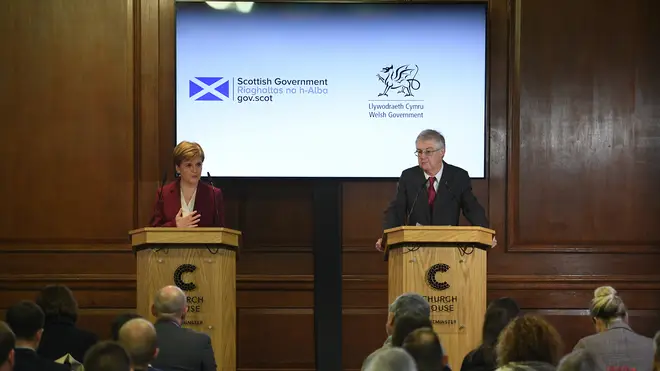
Tom Swarbrick 4pm - 7pm
12 June 2020, 11:27

The First Ministers of Scotland and Wales have written to the Prime Minister calling for an extension to the Brexit transition period amid the coronavirus pandemic.
Nicola Sturgeon and Mark Drakeford said it would be “extraordinarily reckless” to leave the transition period at the end of this year as planned.
In a joint letter, they said an extension is essential to provide “breathing space” to complete negotiations with the EU before 31 Dec 2020.
Read more: UK to backtrack on full border checks with EU due to coronavirus
If the Government decide they do want an extension, it must be agreed upon by by 1 July.
But Boris Johnson has repeatedly insisted he will not ask for a delay, despite businesses and critics warning of the dangers of a departure without a trade agreement in place.

'Do we now need an extension to Brexit transition period?'
Ms Sturgeon and Mr Drakeford said: “Without an extension to the transition period, at very best there will only be a damaging ‘bare bones’ trade deal or even worse, a disastrous no deal outcome.
“We are mindful that the Withdrawal Agreement only permits an extension of the transition period if this has been agreed before the end of June.
“At the time the Withdrawal Agreement was signed, no-one could have imagined the enormous economic dislocation which the COVID-19 pandemic has caused – in Wales, Scotland, the whole of the UK, in the EU and across the world.
“While we hope that the second half of this year will see the beginnings of a recovery, we believe that exiting the transition period at the end of the year would be extraordinarily reckless.
“It would pile a further very significant economic and social shock on top of the COVID-19 crisis, hitting businesses whose reserves, in many case, have already been exhausted, leading to more business closures and redundancies. But in this case, the shock would be avoidable.
“No-one could reproach the UK Government for changing its position in the light of the wholly unforeseeable COVID-19 crisis, particularly as the EU has made it clear it is open to an extension request.
Listen & subscribe: Global Player | Apple Podcasts | Google Podcasts | Spotify
“We therefore call on you to take the final opportunity which the next few weeks provide to ask for an extension to the transition period in order to provide a breathing space to complete the negotiations, to implement the outcome, and to give our businesses the opportunity to find their feet after the enormous disruption of recent months.”
Their letter came came after the fourth round of negotiations failed to reach a breakthrough last week.
EU chief negotiator Michel Barnier lamented there having been "no significant areas of progress" as he accused the UK of having "backtracking" on the agreed political declaration.
His counterpart in Downing Street, David Frost, said they would have to "intensify and accelerate" the process if there was to be any chance of an agreement.
Both sides also said the remote meetings had reached their limit and that face-to-face meetings would be needed in order to progress.
A virtual summit between the Prime Minister and EU chief Ursula von der Leyen to try to break the deadlock in trade negotiations has been scheduled for Monday.
The negotiating teams have also agreed to "an intensified timetable" for July with possible discussions in person if public health guidelines enable them during the coronavirus pandemic.
European Council president Charles Michel and the president of the European Parliament, David-Maria Sassoli will also join the political talks.
A Downing Street spokesman said: "The UK and the EU have agreed an intensified timetable for FTA negotiations in July.
"This new process will involve a mix of formal negotiating rounds and smaller group meetings, both in London and Brussels assuming public health guidelines enable this."
The pace of talks will be scaled up so negotiators will meet in each of the five weeks between June 29 and July 27, No 10 said.